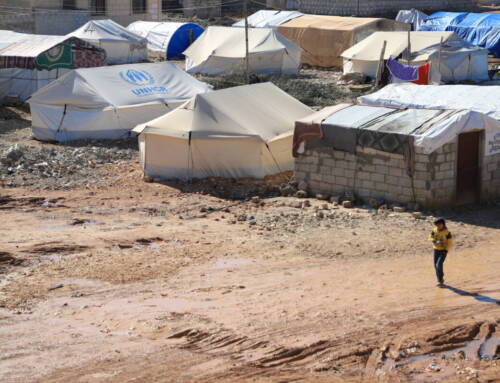Faysal Itani: Islamic Front is ‘Washington’s best chance of containing al-Qaeda’ in Syria
January 13, 2014 Over the past month, the Obama Administration […]
13 January 2014
January 13, 2014
Over the past month, the Obama Administration has wrestled with questions of whether—and to what extent—it should engage with the Islamic Front, a coalition of seven Islamist militias that has emerged as arguably the most potent opposition fighting force since its establishment last November. Washington halted non-lethal aid to the Syrian opposition’s Supreme Military Council (SMC) in early December following the Islamic Front’s seizure of SMC weapons depots at the Bab al-Hawa border crossing, but is reportedly considering a resumption of that assistance despite the possibility that some portion of it could fall to the Islamic Front. U.S. officials have offered to meet for talks with Islamic Front leaders, but the Front rejected the overtures.

In the second of a two-part interview, Itani spoke with Syria Direct’s Alex Simon to discuss the Islamic Front’s ascendance and its implications for American policy, arguing that US policymakers recognize that the Front is their “best chance to contain al-Qaeda—in fact, their only one.” Part one is available here.
Q: What do you make of reports that the US is considering a resumption of nonlethal aid to the SMC, despite the knowledge that FSA fighters are working closely with the Islamic Front?
In all honesty, I am not certain how important these reports are. If this is another laughable attempt at US ‘support’ for the FSA, it means nothing. If, on the other hand, the reports indicate (or are gauging possible domestic attitude towards) a shift toward learning to cooperate with the rebels fighting ISIS, that could be the beginning of something important—especially if the US decides that supporting the Islamic Front is in its interests.
My own sense, however, is that the US is playing catch up in Syria, a few steps behind the dramatic developments we’ve seen in the form of rebel Infighting, and trying to make sense of how it can use the FSA, Jaysh al-Mujahideen and perhaps even the Islamic Front to retain some influence or stake in the forthcoming phase of the conflict.
Either way, even if some nonlethal aid reaches the Islamic Front, it would look bad politically for the Obama administration but change nothing in the military balance in Syria, which is where we ought to be focusing most of our attention.
Q: How ready is the US to engage with the Islamic Front?
I think they are ready. What has the US established as its priorities in Syria? Keep the basic structure of the state intact—they don’t want a complete state collapse—and contain Jabhat a-Nusra and ISIS. And these guys are Washington’s best chance of containing al-Qaeda—in fact, their only one, as I see it. And don’t forget, they’re funded by ostensible US allies, so you can’t ignore the issue. So of course they’ll have to be part of any deal.
Q: And will they actually buy into Geneva?
I don’t think Geneva II can happen under these circumstances. But can the Islamic Front support an outcome that addressed their basic political needs and made them part of the solution? Yea, sure. I don’t think the Islamist nationalists are completely irreconcilable. Some of them are more so than others, particularly Ahrar a-Sham. They would go to Geneva, I think their problem is their ideology. They’d accept Geneva if it created a Syria that they approve of, but the Syria they approve of is unpalatable to the United States.
Q: Many people in the Middle East feel the US has lost interest in removing Assad because of the growing Islamist presence. To what extent do you give credence to this idea?
I give a lot of credence to it, but I don’t follow that reasoning. I don’t think it’s that, “we gave it a try, this is what the opposition has become, therefore we’re with Assad.” I think there was always a deep ambivalence toward the rebels, their agenda, and their ability to make something better out of Syria than what Assad has. I don’t think there was ever a lot of energy and creative thinking going on over Syria—it just wasn’t there at the top levels of the administration. So I don’t think it’s so much a disappointment with the rebellion, I think to a certain extent it’s a self-fulfilling prophecy.
Q: Some people even feel that Washington actually wants to prolong the conflict to let Hezbollah and al-Qaeda kill each other off.
There is a strain of thought in policy circles that feels that way, but I don’t think it’s the animating principle. I do think the idea that they didn’t ever want to do what it took to remove Assad is 100% accurate. I’m not saying nobody did, but not the president, not his main advisors in the White House. And not because of how the rebellion has turned out—all along. Maybe the rebellion would have turned out differently had they helped them, maybe not. But the point is, they didn’t really want to do what it took to get rid of Assad. It would have been a consuming experiment and a proxy war.
Like us on Facebook and follow us on Twitter.







